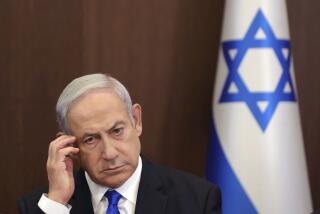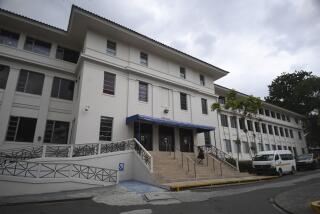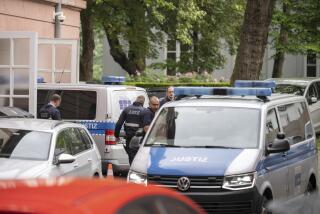Terror Case Against 7 Men Underway in Cambodia
- Share via
PHNOM PENH, Cambodia — Prosecutors opened their case Tuesday against seven men accused of plotting to bomb Western targets in Cambodia, but three of the key suspects -- including Asia’s top terrorism suspect, Hambali -- were being tried in absentia.
Prosecutor Yet Chakriya accused the seven defendants of “attempted premeditated murder with the goal of terrorism,” which carries a sentence of life imprisonment.
The suspects present at the trial were Esam Mohammed Khidr Ali of Egypt, Abdul Azi Haji Chiming and Mohammed Yalaludin Mading of Thailand and Sman Ismael of Cambodia.
Being tried in absentia were Hambali, who is Indonesian, and two other foreigners identified only as Rousha Yasser and Ibrahim. Hambali was arrested in Thailand in August 2003 and is being held by U.S. officials at an undisclosed location.
The four suspects present in court were arrested in May and June 2003 on suspicion of having ties to Jemaah Islamiah, which some experts describe as Al Qaeda’s Southeast Asian arm. Cambodian police had broken up their Umm Qura group, which operated a Saudi-funded school outside Phnom Penh.
Umm Qura, Chakriya said, was a terrorist cell associated with Jemaah Islamiah, and its “main role was to attack the United States and British embassies in Cambodia.”
Hambali, Jemaah Islamiah’s suspected operations chief whose real name is Riduan Isamuddin, reportedly spent several months in Cambodia in 2002. He tried to use the country as a base from which to launch regional attacks, the prosecution said.
Chakriya alleged that Hambali taught the Egyptian, Thai and Cambodian suspects “how to set off explosions” and that the men “closely cooperated in hiding Hambali.”
The four suspects in the courtroom denied the charges, saying they worked for a charity to help poor Cambodians.
A prosecution witness, garage worker and taxi driver Thorn Lundi, told the court that Ibrahim had told him he planned to use a car bomb to attack the British Embassy.
Abdul Azi Haji Chiming told the court that Hambali had left two bags with him while he traveled from Phnom Penh. One contained money, clothes and a computer CD.
“When I played it, I saw Arabic songs, and another disc showed a car with four black boxes and an arrow sign saying ‘bomb.’ I did not know what it was about,” he said.
When Judge Ya Sokhan asked him if he had accompanied Hambali to the British Embassy, he replied: “I did not even know where the embassy is located.”
The judge is expected to deliver a verdict today.
More to Read
Sign up for Essential California
The most important California stories and recommendations in your inbox every morning.
You may occasionally receive promotional content from the Los Angeles Times.













